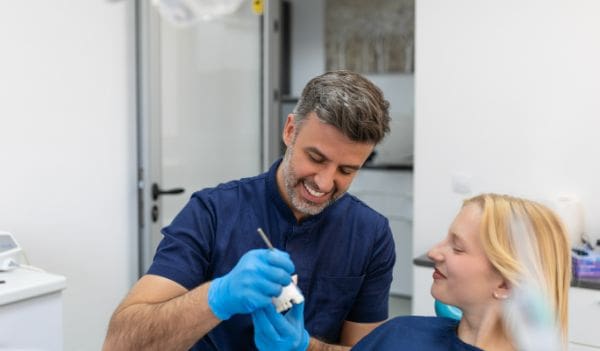
Having the perfect teeth takes regular maintenance and often much care and attention. However, even with the best care possible, teeth succumb to damage over time and whilst you could attempt to change habits to prevent this, often it is safe to remove a tooth which may be corroded beyond repair.
Removal of a tooth can cause significant gaps along gums, which may manifest as insecurity for individuals. At Bespoke Dental, we aim to provide all our patients with the most beautiful smile whilst offering confidence with every bite. Suppose you have lost a tooth due to accidents or decay. In that case, many options exist to fill the gap, one of which is a dental bridge. Learn all there is to know about dental bridges and discover if this could be the best option for you.
What Are Dental Bridges?
The procedure of installing a dental bridge can replace singular or multiple teeth that may have been lost due to tooth decay or accidents. Dental bridges offer fake teeth replicating original teeth, matching in colour and size to provide the most life-like imitations and function as natural teeth.

Whilst crowns offer an ideal solution to chips and holes, a dental bridge will replace the entire missing tooth with a crown on either side acting as an anchor, which is where the term bridge originates from. Dental bridges are ideal for adjacent missing teeth.
How Long do Dental Bridges Last?
Each dental bridge varies on an array of scenarios unique to each patient. There are many factors to consider;
Oral Hygiene – Regular cleaning and maintenance of your teeth will help the lifespan of your dentures. This includes brushing twice daily, flossing between meals and regular checkups. Lack of care will significantly shorten the length of your dental bridge as the teeth supporting the crowns will begin to decay and loosen the bridge.
A Good Diet – A balanced diet filled with nutrients helps ensure good dental health, which can extend the length of your dental bridge. Calcium and vitamin D are essential supplements which encourage strength in your teeth.
Reduce Toxins – Cutting down on anything which may implicate decay with your teeth is an excellent general practice for dental bridges. Smoking, acidic foods like oranges and lemons, coffee, alcohol and even hard and chewy foods can all impact your teeth. Cutting back on these and reducing your processed sugar intake can increase the life of your dental bridge.
Illnesses – Sometimes long-term illnesses can affect your teeth. This can be due to struggling to absorb nutrition or vitamins which are essential to the life of your dental bridge.
Generally speaking, a dental bridge can last between 5-15 years, depending on the patient’s situation.
What to Expect Throughout the Procedure of a Dental Bridge
When booking a consultation for a dental bridge, the dentist will check the strength and suitability of your teeth before carrying out the procedure. If the remaining teeth at either side of the gap are not strong enough, a dental bridge will be unsuccessful, and a dental implant may be a more viable option.

However, if the corresponding teeth will support a bridge, the dentist will offer two types of options: a bonded bridge or a conventional bridge. The bonded bridge will involve bonding the bridge on the adjacent tooth using special dental cement. A conventional bridge will simulate a crown, and your adjacent teeth will be shaped to support a bespoke fitted bridge.
The dentist will remove any decay before your treatment and mould a bridge which is an impression of your original teeth.
The procedure will take around three visits to the dentist. The first is the consultation stage, the second will be to create the impressions, and the final will be the dental bridge installation. The final procedure should take no more than an hour and a half.
Recovery After a Dental Bridge
For the first few days or up to a week, gums may feel slightly tender, like with most procedures. There is no long-term requirement to stay off work or school, and most patients return to normal activities the day following their appointment.
If you are uneasy about the appointment or have a significant fear of dental work, at Bespoke Dental & Implant Clinic, we are one of the best sedation dentists in Manchester. We can help ease the worry of the procedure with either oral or intravenous sedation. However, if you have chosen either of these options, you will be unable to drive yourself after the appointment, so be sure to have someone to ensure you get home safely and may need a day or two more to recover from the sedation.
Aftercare of Your Dental Bridge
Taking care of your dental bridge is very much the same as you should take care of your natural teeth.
- Brush twice a day
- Floss between meals
- Regular visits to your dentist
- Follow any aftercare advice from your dentist
Dental bridges offer a quick and cost-effective way of replacing missing teeth which may be needed for cosmetic or eating purposes. Ensuring excellent dental hygiene can be of a significant benefit prior to and after the procedure. For the best advice for your situation, it is essential to speak with your dentist after your treatment.

If you are conscious of the gaps in your teeth, we offer a range of other solutions to replace missing teeth or fill gaps with various treatments including;
We also offer other services and are one of the quickest emergency dentists in manchester, so for all your short-term or long-term dental problems, enquire online, and one of our helpful team will be sure to get back to you.